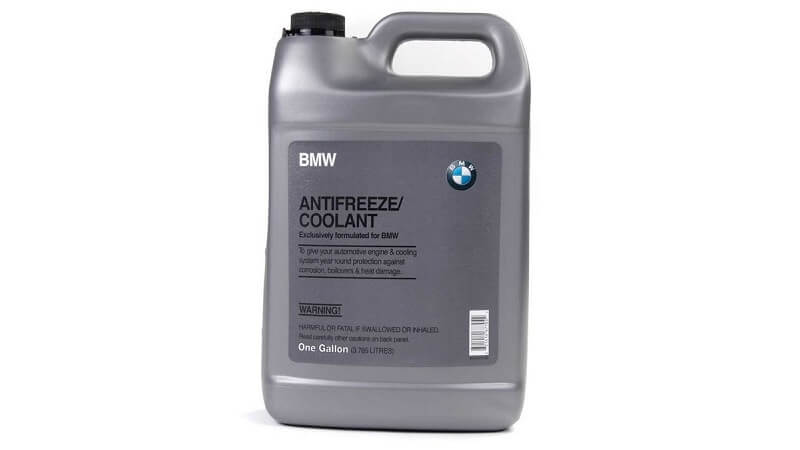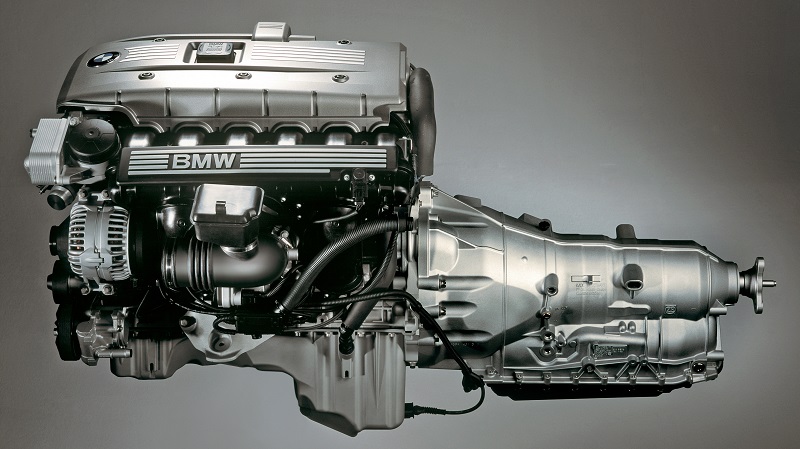In the luxury car world, few names carry as much prestige and reputation as BMW. For decades, BMW has been at the forefront of innovation and has produced vehicles with a seamless blend of performance, luxury, and cutting-edge technology. From luxury SUVs to powerful coupes and sedans, BMW’s engines have delivered precision, efficiency, and an unmatched driving experience.
The BMW B48 engine has captured the attention of enthusiasts and industry experts alike. This turbocharged I4-cylinder 2.0L engine represents the pinnacle of BMW’s engine technology and boasts a delicate balance of power, refinement, and efficiency.
However, even masterfully crafted engines are not immune to potential issues, and the BMW B48 is no exception. While the B48 engine is known for its reliability and performance, BMW owners need to know the common problems that may surface with it. This helps take proactive measures to address any concerns before they escalate.
In this blog post, we’ll put the BMW B48 engine under the scope, exploring its design, features, and the models it powers. More importantly, we’ll focus on the most common issues faced by B48 engine owners, providing insights into their causes and symptoms. With this knowledge, you’ll be better equipped to tackle the challenges that may arise.

BMW B48 Engine — Everything You Need to Know
The BMW B48 is a four-cylinder turbocharged gasoline engine that has been in production since 2014. It belonged to BMW’s modular B-series engine and was designed to focus on efficiency and performance, replacing the older N20 engine. As part of the B-Series, the B48 shares many design similarities with other engines in the same family, such as the B38, B46, and B58.
Straight from the factory, the BMW B48 engine has impressive internal components similar to the B58. It offers forged connecting rods and a crankshaft, which are more durable than their cast counterparts. The B48 engine has a closed-deck block design, which enhances the engine’s overall strength and offers a more robust cooling system. The block and cylinder head are also constructed from aluminum, common in B-series engines.
One of the key features of the B48 engine is BMW’s TwinPower Turbo technology, which combines twin-scroll turbocharging and direct injection for improved power delivery and fuel efficiency. This engine is designed to be extremely fuel efficient and produce fewer emissions thanks to variable valve timing (VANOS), variable valve lift (Valvetronic), and an integrated exhaust manifold.
Additionally, the B48 engine has been engineered with a focus on reliability and durability. This makes it popular among BMW fans and drivers who value performance and efficiency.
BMW Model Lines
The BMW B48 engine is used across multiple generations of BMW models, including the 2 Series, 3 Series, 4 Series, 5 Series, X1, X2, X3, X4, and Z4. With updates and improvements over the years, its latest iteration offers a revised cylinder head, an updated turbocharger, and an enhanced cooling system. These are US-spec models equipped with the B48 engine, sold as B46.
- BMW 230i (F22 / F23) — (2016–present)
- BMW 330i, 330e (F30 / F31 / F34) — (2015–2018)
- BMW 330i, 330e (G20 / G21) — (2019–present)
- BMW 430i (F32 / F33 / F36) — (2016–present)
- BMW 430i (G22) — (2020–present)
- BMW 530i (G30 / G31) — (2016–present)
- BMW X1 28i (F48) — (2016–present)
- BMW X2 28i (F39) — (2017–present)
- BMW X3 xDrive30i (G01) — (2018–present)
- BMW X4 xDrive30i (G02) — (2018–present)
- BMW Z4 sDrive30i (G29) — (2019–present)
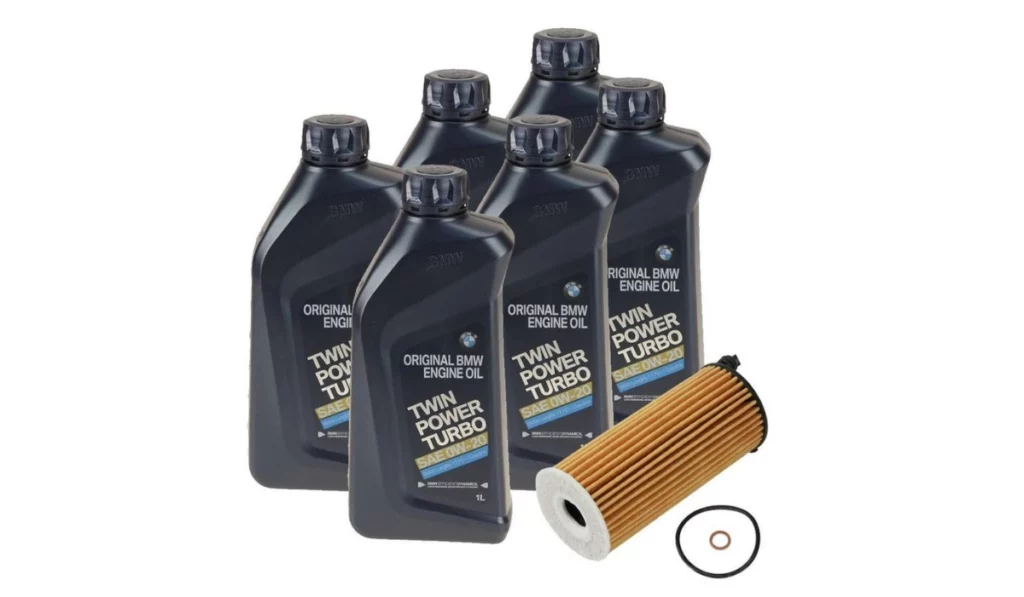
Is the B48 more reliable than the B58?
While the BMW B48 and B58 engines have similar architectures and are both known for their reliability, the B58 engine has a slight edge in dependability. This advantage comes from its larger displacement, which allows it to manage heat better and handle higher loads than the smaller B48.
However, it’s important to note that both engines are exceptionally well-built and robust, with any differences in reliability being relatively minor. Ultimately, proper maintenance is crucial for ensuring the longevity of either engine, as they are both considered highly reliable powerplants when cared for properly.
BMW B46 vs BMW B48 engine — What’s the key difference?
The B46 and B48 are part of BMW’s modular engine families, designed to meet stringent emissions norms. The key difference is that the B46 is a Super Ultra Low Emission Vehicle (SULEV) version of the B48, meaning it has been optimized for even lower emissions than the standard B48.
Both engines share many similarities, such as aluminum construction with a closed-deck design for increased rigidity and reduced noise, vibration, and harshness. They also feature advanced technologies like VANOS, Valvetronic, turbocharging, and direct fuel injection for improved power delivery and efficiency.
However, the B46 has been particularly engineered to achieve super ultra-low emissions levels in the US, likely through changes in the fuel injection system, exhaust gas recirculation, and other components responsible for controlling emissions. It may also feature unique calibrations and tuning to prioritize emissions reduction over outright performance.
Overall, the B46 and B48 are closely related engines, with the B46 being the more environmentally friendly variant, favoring the strictest emissions standards set by the U.S. Environmental Protection Agency (US EPA).
Is the BMW B48 a good engine?
The BMW B48 has received generally positive reviews and is often considered the smaller sibling of the famous B58 engine, which is arguably the best BMW engine ever created. The B48 engine is known for its smooth power delivery, good fuel efficiency, and relatively low noise and vibration levels.
Many automotive experts consider it one of the best small turbocharged engines on the market. However, like any engine, its long-term reliability can vary based on maintenance and driving conditions.
Get Top-quality BMW Parts at Discounted Rates
At Bimmers.com, let your Bavarian beast unleash its full prowess. We offer an extensive range of genuine BMW and OEM parts at unbeatable prices. Our careful selection adheres to the brand’s stringent standards. These parts ensure your ultimate driving machine operates flawlessly, with perfect fitment and top-notch performance.
Rule the tarmac without breaking the bank. Whether you’re a seasoned devotee or a newly minted BMW lover, Bimmers.com provides unbeatable value without compromising quality. We guarantee your prized ride receives only the finest parts.
Elevate your experience at Bimmers.com and take your BMW driving to new heights. Join a passionate community that shares your obsession with keeping your beloved BMW in immaculate condition.
Most Common Problems on BMW B48 Engine
After learning the core history of the BMW B48 engine and its difference from the B46 engine, let’s learn about the most common problems with the BMW B48. While compared to its predecessor, the BMW N20 engine, the B48 engine has seen good improvements, it is not exempt from its share of issues. Let’s take a look at them.
Valve Cover Gasket Leaks
The valve cover gasket is a crucial component that seals the valve cover to the cylinder head, preventing oil leaks. The valve cover gaskets in the B48 engine can deteriorate or become damaged over time, leading to oil leaks.
The main causes of valve cover gasket failures on the BMW B48 are consistent heat cycling and the materials used in the gaskets. Due to normal wear and tear, valve cover gaskets typically wear out between 70,000 and 100,000 miles.
Leaking valve cover gaskets can result in oil drips or stains around the valve cover area, a burning oil smell, and increased oil consumption. In the case of severe oil leaks, it can lead to visible smoke from the engine bay. Quickly addressing this issue is crucial to prevent further engine damage or contamination.
Oil Filter Housing Leaks
A cracked oil filter housing leads to oil leaks and oil/coolant mix. The main cause of cracked oil filter housing is BMW’s choice of material, which, like many other parts in B-series engines, is plastic. At moderately high mileage, the oil filter housing tends to crack.
It is evident through the signs such as oil drips or stains, low oil levels, frequent need for top-ups, and a burning oil smell. It’s significant to address this issue quickly to prevent potential engine damage caused by low oil levels.
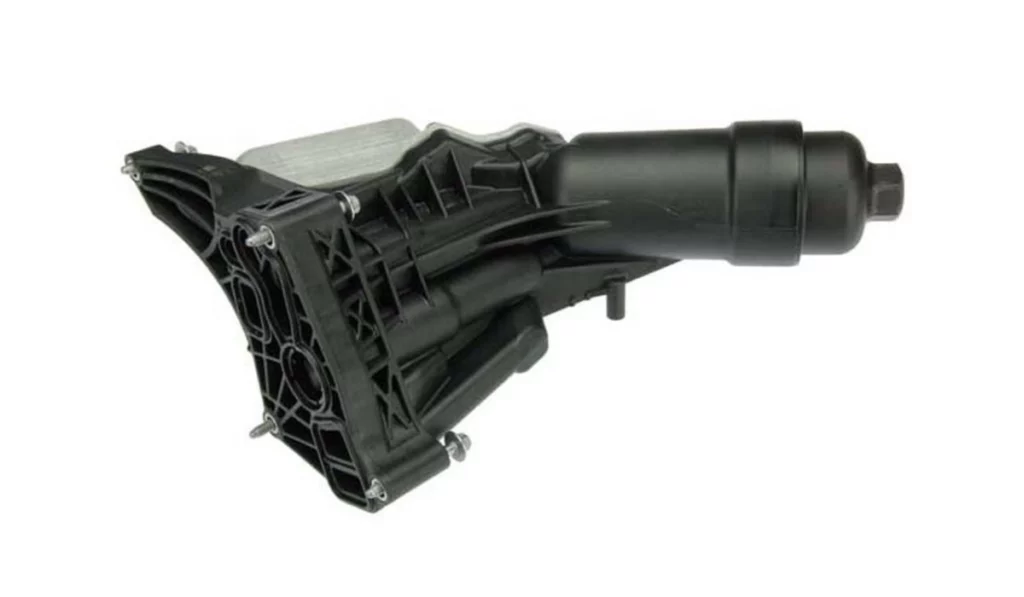
Regular inspections and maintenance can help detect oil filter housing cracks, allowing for timely repairs to avoid more severe problems. If you notice any signs of oil leakage or a burning oil smell, it’s advisable to address this problem early to stop potential engine damage.
Water Pump Failure
The water pump is a key component of the B48 engine’s cooling system. It circulates coolant through the engine to regulate its temperature. The B48 engine features two water pumps: a primary belt-driven water pump and a secondary electric water pump that helps cool the turbochargers once the engine is turned off.
However, the main water pump (belt-driven) can fail over time due to wear and tear, leading to potential overheating issues. They tend to fail at around 70,000 to 100,000 miles on average.
If it fails, it can easily be spotted with issues such as overheating with a yellow or red coolant warning message on the instrument cluster. Neglecting a failing water pump can lead to severe engine damage.
Coolant Leaks
Coolant leaks are another common issue with the BMW B48 engine. These leaks can occur due to a faulty water pump, a leaking radiator, and, more commonly, deteriorating coolant hoses. When coolant leaks happen, it can reduce the coolant levels in the engine, leading to overheating and potential engine damage if not addressed early.
One prevalent cause of coolant leaks is an incorrectly installed gasket, particularly around the turbocharger connection lines. Coolant can leak from these connections if the gasket fails to seal properly.
This can be identified through drips or stains around the turbocharger area. In severe cases, it may cause a significant loss of coolant, leading to low coolant levels. Coolant puddles underneath the vehicle, a sweet smell from the engine bay, or visible stains or residue around coolant hose connections are some signs of coolant leaks.
Regularly monitoring coolant levels and conducting visual inspections for leaks is crucial in detecting any issues early on.
Carbon Buildup
While the B48 engine is designed to reduce carbon buildup compared to its predecessor, the N20, it is still susceptible to this issue, particularly in certain driving conditions or improper maintenance. According to our findings, the B48 engine will have carbon buildup at around 100,000 miles.
Short-trip driving, frequent idling, improper fuel quality or oil changes, and a faulty Positive Crankcase Ventilation (PCV) valve can cause excessive carbon buildup. This impacts the engine performance through reduced fuel efficiency, hesitation during acceleration, rough idling or misfiring, and increased emissions.
Injector Failure
Early versions of the BMW B48 engine often have problems with fuel injectors failing. Fuel injectors deliver fuel into the engine’s cylinders required for combustion. When they fail, they can cause rough idling, misfiring, and worse fuel efficiency.
The issue worsens in tuned or modified engines, leading to more heat and stress. If an injector fails in the open position, it lets too much fuel into the cylinder, washing away the oil that lubricates the parts.
If not fixed, excessive heat can crack the pistons without proper lubrication. Misfires that continue even after changing spark plugs and ignition coils could mean the injectors are bad. Early address of injector problems is important to prevent further damage inside the engine.
Cylinder Head Ventilation Line Issue
The factory-set plastic ventilation line is the core cause of this issue. It is prone to breaking due to excessive heat buildup, which leads to a heavy loss of coolant in the engine. In a severe case, it could drain most of the coolant in the system.
To tackle this issue, BMW issued a Technical Service Bulletin (TSB) and suggested replacing a plastic ventilation line with a rubber one to reduce the chance of self-breaking or cracking. BMW will tackle this service action at no cost to the owner. It involves F22, F23, F30, F31, F32, F33, F34, and F36 vehicles produced between April 24, 2015, and September 24, 2019.

Weak Piston and Piston Rings
The BMW B48 engine has been plagued by issues related to weak pistons. Numerous owners with tuned BMW B48 engines have reported this problem, with some experiencing catastrophic engine failure due to the pistons breaking or cracking.
If not done correctly, tuning the BMW B48 engine usually leads to piston cracking. This excess stress can cause piston rings to wear prematurely and pistons to develop cracks and fail. The issue can easily be understood by signs such as excessive noise, loss of power, and warning lights illuminating the dashboard before the engine fails.
To mitigate piston and piston ring issues on the BMW B48 engine during tuning, consider upgrading to forged pistons and stronger piston rings designed for higher-performance applications.
Vanos Actuator Issue
The B48 engine may experience issues with its VANOS actuators and sprockets. BMW’s VANOS is a mechanism that adjusts the timing of the camshaft according to the engine’s speed, utilizing variable oil pressure. Simply put, it adjusts the opening/closing of engine valves at different engine speeds for a smoother and more efficient operation.
The VANOS valve actuators, essentially solenoids, regulate the oil pressure needed for this adjustment. If these solenoids malfunction, it can lead to engine shuttering, stalling, or misfires. The issue is particularly common in cold weather conditions.
Cold weather affects the Vanos actuator by increasing oil and hydraulic fluid viscosity, contracting components, and causing excessive strain during cold starts. This accelerates the wear and potential failure of the actuator over time, especially with repeated exposure to extreme winter conditions.
Proper maintenance and using the right engine oil are crucial, but eventual actuator replacement may be required for some higher mileage B48 engines.
Can you tune a B48?
Yes, the BMW B48 engine can be tuned for increased performance. Popular tuning methods for the B48 include remapping the digital motor electronics (DME) software and performing bolt-on upgrades. However, it’s important to note that tuning can potentially void the factory warranty and may affect the engine’s reliability if not done properly by a reputable tuning shop.
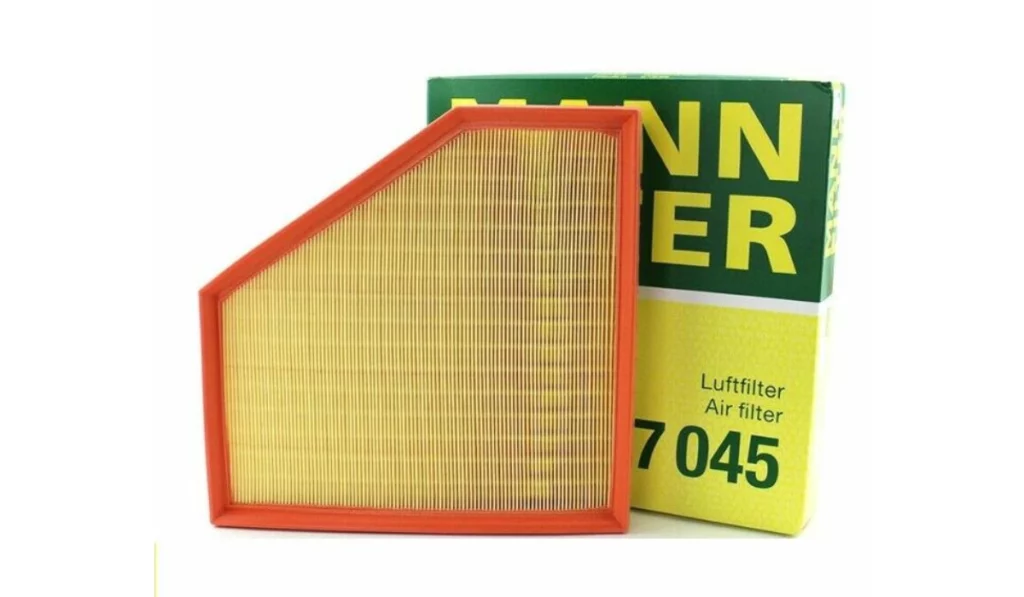
Maintenance and Care Tips
Proper maintenance is key to ensuring the longevity and reliability of your BMW B48 engine. By following these tips, you can mitigate the risk of common issues and keep your vehicle running at its best.
Manufacturer Recommended Service
Follow the manufacturer’s recommended service schedule for the BMW B48 engine for more accurate information on service intervals.
BMW typically recommends servicing the B48 engine every 10,000 miles or every year, whichever comes first. This can vary depending on driving conditions and usage. Additionally, stay updated on any service bulletins or recalls related to the B48 engine issued by BMW.
Spark Plugs Replacement
Spark plugs are crucial in the combustion process inside the engine. If you run a stock B48 engine, consider replacing it every 30,000 miles.
Regular Oil Changes
This is the most critical aspect of engine maintenance. Stick to BMW’s recommended oil change intervals or do it sooner to protect the engine well. Your driving habits and environmental conditions may also affect your service interval. Make sure to use high-quality synthetic oil that meets BMW LL specifications.
Monitor Coolant Levels
Keep an eye on the coolant level, ensuring it’s filled to the proper level. The coolant should be changed according to the manufacturer’s recommendations.
Check the Air Filter
A clean air filter is essential for optimal engine performance. Inspect and replace the air filter as needed. The air filter should typically be replaced at 30,000 to 50,000 miles, depending on driving conditions. For precise information on engine air filter replacements on your BMW with B48 engine, refer to your vehicle’s owner’s manual.
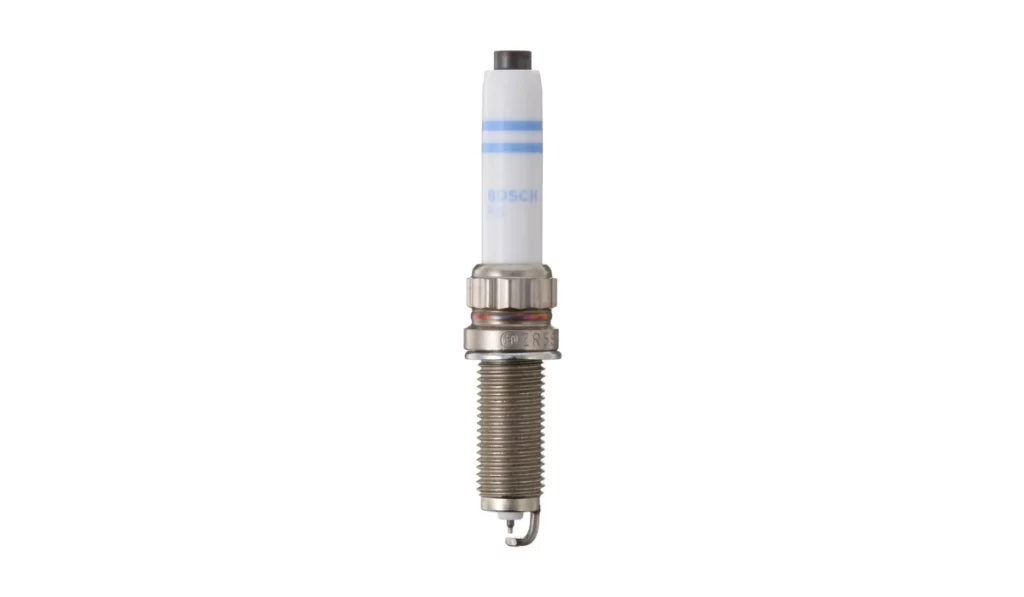
Inspect Belts and Hoses
Periodically inspect the drive belts and hoses for wear, cracks, or leaks. Replace them if necessary to prevent unexpected failures.
Fuel System Maintenance
Use high-quality fuel and consider using fuel additives periodically to keep the fuel system clean and prevent carbon buildup in the intake valves.
Address Warning Lights Immediately
If you notice any warning lights on the dashboard or experience unusual noises or vibrations, inspect the vehicle immediately to resolve the issue and prevent further damage.
Drive Responsibly
Avoid aggressive driving and excessive revving, especially when the engine is cold. This can put unwanted strain on the engine components and lead to premature wear.
Maintenance Upgrades for tuned BMW B48 engine
If your BMW B48 engine is tuned, it necessitates early maintenance, unlike a stock B48 engine. This helps the engine parts stay in shape to handle increased engine pressure.
Quality BMW B48 Engine Components from Bimmers.com
Does your BMW’s B48 engine need some love? Look no further than Bimmers.com, where we offer high-quality genuine BMW and OEM parts for this great engine. Whether you need a valve cover gasket or a replacement for a common failing component, we’ve got everything you need.
At Bimmers.com, we don’t stop there. We offer a range of maintenance items tailored to your B48 engine’s needs, from spark plugs and coolants to air filters, hoses, and belts.
Quality is our top priority; every part meets BMW’s standards. We aim to combine affordability with quality, ensuring your BMW receives the best treatment it needs. Whether you’re tackling a repair or need maintenance accessories, we’ve got you covered. Choose Bimmers.com today and see the difference.











